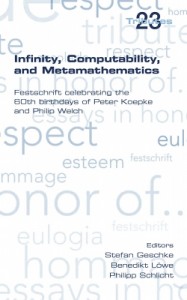This will be a talk for the Logic and Metaphysics Workshop at the CUNY Graduate Center, GC 5382, Monday, October 24, 2016, 4:15-6:15 pm.
 Abstract. In light of the comparative success of membership-based set theory in the foundations of mathematics, since the time of Cantor, Zermelo and Hilbert, it is natural to wonder whether one might find a similar success for set-theoretic mereology, based upon the set-theoretic inclusion relation
Abstract. In light of the comparative success of membership-based set theory in the foundations of mathematics, since the time of Cantor, Zermelo and Hilbert, it is natural to wonder whether one might find a similar success for set-theoretic mereology, based upon the set-theoretic inclusion relation
This is joint work with Makoto Kikuchi, and the talk is based on our joint article:
J. D. Hamkins and M. Kikuchi, Set-theoretic mereology, Logic and Logical Philosophy, special issue “Mereology and beyond, part II”, pp. 1-24, 2016.


